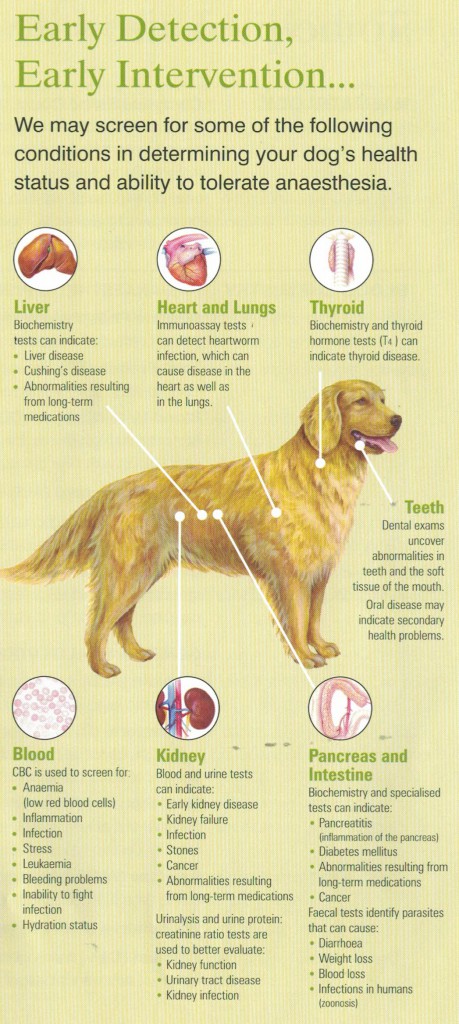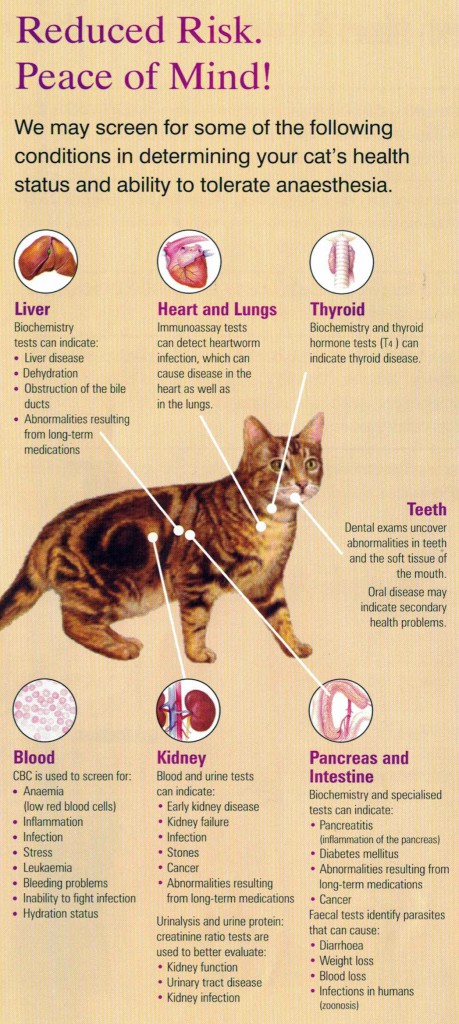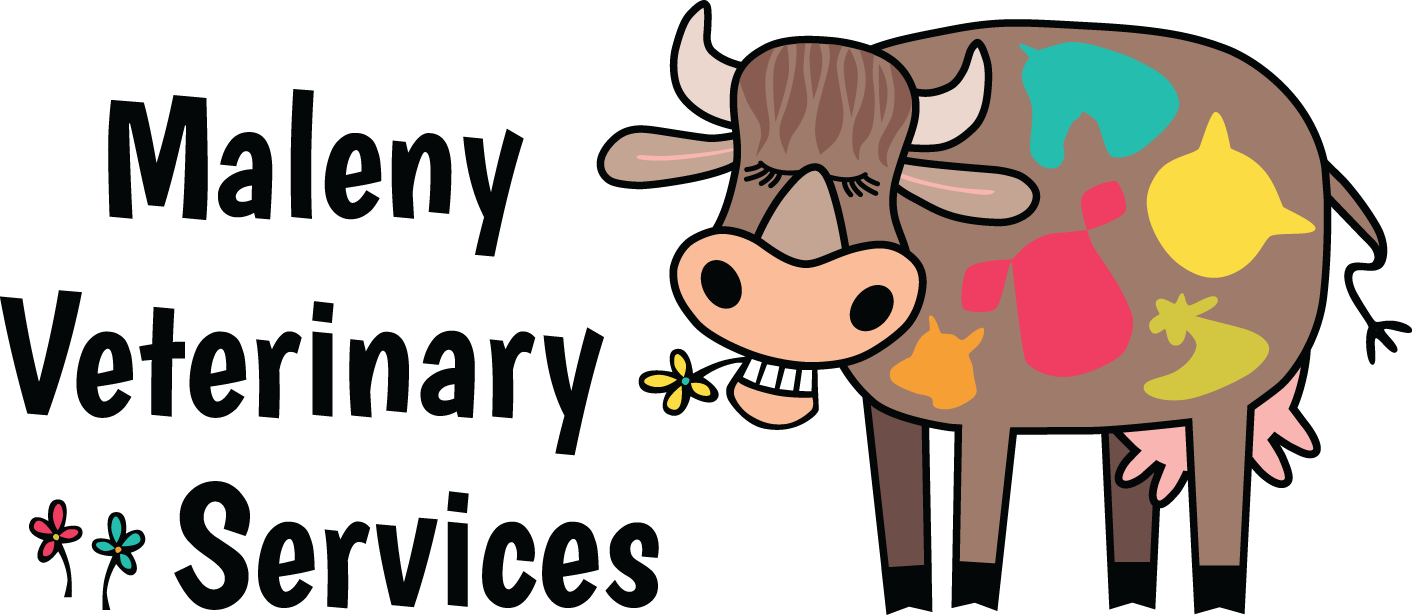Help us keep your pet healthy with pre-anaesthetic testing!
To ensure your pet can properly process and eliminate an anaesthetic, we can run tests to confirm that your pet’s organs are functioning properly and to find hidden health conditions that could put your pet at risk. The TOP FOUR REASONS to test your pet before anaesthesia:
- Enjoy peace of mind. Testing can significantly reduce medical risk.
- Detect hidden illness. Healthy-looking pets may be hiding symptoms of a disease or ailment. Testing helps detect this so we can avoid problems with anaesthesia.
- Reduce risks and consequences. If the pre-anaesthetic testing results are normal, we can proceed with confidence. If not, we can alter the anaesthetic procedure or take other precautions to safeguard your pet’s health.
- Protect your pet’s future health. These tests become part of your pet’s medical record, providing a baseline for future reference.
Please call us on 07 5494 3622 or book online to chat with one of our veterinarians about pre-anaesthetic testing.
Pre-anaesthetic testing helps ensure safe anaesthesia for your pet. In preanaesthetic testing, we will run a combination of the following tests:
Haematology
Complete Blood Count (CBC) A CBC provides detailed information about red blood cells, white blood cells and platelets. The total white blood cell count, along with individual leucocyte counts, can help identify underlying stress, inflammation, an inability to fight infection and potentially, leukaemia.
Low platelet numbers can indicate a potential bleeding problem. We might advise that surgery be delayed if anaemia, inflammation or, especially, a low platelet count is present because these conditions could result in serious surgical conditions.
Blood chemistry
Pre-anaesthetic panel (PAP)
- Alkaline Phosphatase (ALKP) An enzyme present in multiple tissues, including liver and bone. Elevated levels can indicate liver disease, Cushing’s syndrome or steroid therapy.
- Total Protein (TP) The level of TP can indicate a variety of conditions, including dehydration, inflammation and diseases of the liver, kidney or intestine.
- Blood Urea Nitrogen (BUN) BUN is produced by the liver and excreted by the kidneys. Abnormally high levels can indicate kidney disease or dehydration, and low levels can be associated with liver disease.
- Aminotransferase (ALT) An enzyme that becomes elevated with liver cell injury.
- Creatinine (CREA) Creatinine is a byproduct of muscle metabolism and is excreted by the kidneys. Elevated levels can indicate kidney disease, urinary tract obstruction or dehydration.
- Blood Glucose (GLU) High levels can indicate diabetes. In cats, high levels can also indicate stress, which can be a result of the trip to the veterinary hospital. Low levels can indicate liver disease, infection or certain tumours.
General health profile (GHP)
PAP plus the following tests:
- Albumin (ALB) A protein that is produced by the liver. Reduced levels of this protein can point to chronic liver, kidney, inflammatory or intestinal disease. Elevations indicate dehydration.
- Cholesterol (CHOL) Elevated levels of cholesterol are seen in a variety of disorders, including hypothyroidism and liver or kidney disease. Reduced levels can occur with liver dysfunction or some intestinal diseases.
- Total Bilirubin (TBIL) Bilirubin is a breakdown product of haemoglobin, as well as a component of bile. Blood bilirubin levels are useful in indicating liver disease and may help identify certain types of anaemia.
- Amylase (AMYL) An enzyme produced by the pancreas. The pancreas secretes amylase to aid in digestion. Elevated levels in the blood can indicate pancreatic disease.
- Phosphorus (PHOS) Elevated phosphorus can be an indicator of kidney disease.
Calcium (Ca+) Increased levels can be seen with diseases of the parathyroid gland and kidneys, or as an indicator of certain types of tumours.
Electrolytes
Sodium, Potassium, Chloride (Na+, K+, CI-) The balance of these electrolytes is vital to your pet’s health. Abnormal levels can be life-threatening. Electrolyte tests are important when evaluating vomiting, diarrhoea, dehydration and cardiac (heart) symptoms.
Urinalysis
(UA) The urine contains byproducts from many organs, such as the kidneys, liver and pancreas. Abnormal levels of these byproducts can indicate diabetes or liver or urinary tract disease.
Electrocardiogram
(ECG) Detects heart rate and electrical rhythm. Certain abnormal rhythms and heart rates can be harmful to animals undergoing anaesthesia.
Endocrinology
Thyroxine (T4) This is a measurement of the level of thyroid hormone circulating in the blood, and is helpful in identifying thyroid disease. Thyroid disease occurs in both dogs and cats, and can.have a serious impact on health if left untreated. Testing is especially important in cats older than seven years.
Other general tests
Heartworm Heartworms are parasites that can live in the heart, major blood vessels and the lungs. Left untreated, heartworms can be life-threatening.
Gamma-Glutamyl Transferase (GGT) Increases in GGT, a liver enzyme, are a measure of cholestasis.
Other specific tests
Pancreatic Elevated canine pancreatic lipase (cPL) and feline pancreatic lipase (fPL) , along with Clinical assessment can help determine whether patients have pancreatitis, a potentially serious condition.
Feline specific tests
Feline Immunodeficiency Virus (FIV) and Feline Leukaemia Virus (FeLV) FIV and FeLV infection are two of the most serious, life-threatening illnesses in cats.


We are open seven days a week so if you have any questions, please give us a call on 5494 3622 or book online!
